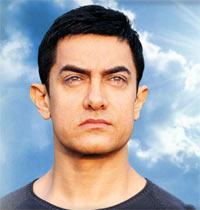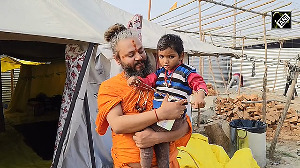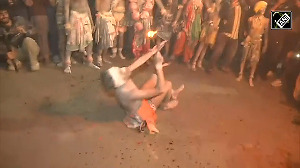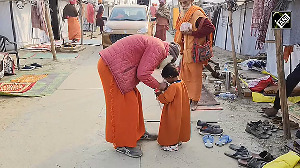 The latest episode of Aamir Khan's television show Satyamev Jayate probed into malpractices that some doctors follow, looking at the way they dole out wrong treatments for monetary gains. It has understandably not gone down too well with the medical fraternity.
The latest episode of Aamir Khan's television show Satyamev Jayate probed into malpractices that some doctors follow, looking at the way they dole out wrong treatments for monetary gains. It has understandably not gone down too well with the medical fraternity.
Dr Sanjay Nagral -- a consultant surgeon, department of surgical gastroenterology , Jaslok Hospital and Research Centre, Mumbai -- explains what exactly has hurt the doctors.
Satyameva Jayate's recent episode on healthcare in India has created quite a stir within my fraternity. What began as benign posts on social media and closed door conversations has snowballed into a movement against what is being described as a 'diatribe' by Aamir Khan against the medical profession.
In an additional bizarre twist, the Indian Medical Association, the apex body of medical professionals in the country, is asking Aamir to 'apologise' and, in what can only be termed as an acute case of silliness, has called for 'boycotting' him.
The issues raised in the show, and the profession's response to them, have important lessons. Lest they get lost in the din and drama, here is a contrarian view for the record.
What is it exactly in that episode that has hurt my colleagues?
From my reading of the various statements, it seems there are some common themes that many are upset about.
First, the show 'exaggerated' the extent of unethical practice in the profession. Second, it showed only the 'bad' side of the profession, not the 'good'. Third, it was factually incorrect at times.
There were those who wanted to know why doctors are being targeted when the entire society is corrupt.
Finally, the one below the belt: Who is Aamir Khan to pontificate about service to the poor when he charges crores of rupees for the show?
The last one, though probably the most superfluous, is the most emotive of all.
Is it really a revelation that 'stars' like Aamir charge such amounts for television serials? If Aamir declares he has not charged for the show, will it in any way alter the response to the show?
Post your comments on Satyamev Jayate here.
Now, we come to the more substantive issues.
What was one of the unethical practices that the show highlighted and 'exaggerated'? The episode talked about the practice of 'cuts' and 'commissions' that are offered by doctors, labs and hospitals for referral of patients. These are cash transactions; they are not revealed in official documents and are arbitrary in amount.
Although there is no documentation of the extent of this practice (Not surprising! How many would admit to it?), having had a ringside view in a large metropolis for many years, I would suggest it involves a large majority of referrals.
We can quibble over the precise extent, but that would just serve to obfuscate the issue at hand.
Hasn't such 'fee splitting' become so commonplace and institutionalised that, as a young doctor, if you don't participate in it, you are effectively ostracised? Isn't this activity non-transparent and doesn't it increase the cost of health care and affect quality? Has any medical association ever tried to build internal resistance or opposition to such a patently corrupt practice?
The show talked about the shocking state of the Medical Council of India and how its president, Dr Ketan Desai, was arrested by the CBI in 2010 on charges of corruption. He was thereafter removed from the post of MCI president by the government and is now cooling his heels in Tihar jail.
Desai amassed crores (one estimate pegs the amount of money recovered from the raid on his home at Rs 1800 crore (Rs 18,000 million)) from the lucrative business of recognition of medical colleges.
The episode also showed how Desai, who had been indicted by the courts and temporarily sacked in 2002, staged a return. What the episode did not mention is that the same individual was also the national president of the Indian Medical Association.
Thus, a convicted individual not just survived but actually thrived for an entire decade at the highest levels in the Indian medical establishment both as the president of the Medical Council as well as the IMA. Isn't this a reflection of the permissiveness and ambivalence medical professionals have developed towards corruption in their own representative bodies?
The current president Dr K K Talwar, who appeared on the show, had no credible answer when asked why not a single doctor in India has had his licence cancelled when the General Medical Council of the UK figures showed substantive numbers every year.
One of the 'errors' repeatedly pointed out by those outraged by the show is the numbers that were quoted about private and public medical colleges in India. One wonders, though, what is more important -- the precise number or the fact that India can be counted among the countries that have the highest number of private medical colleges in the world? Isn't the crass commerce of medical education in these colleges, where seats are sold at high prices, the real issue?
Isn't it true that private medical college empires have grown because they have managed to hire and retain medical teachers, set up arrangements with hospitals to provide 'clinical material' in the form of patients and get recognition for postgraduate courses from inspection teams consisting largely of doctors?
Of course, there is a large industry supported by politicians at work here but the collusion of the profession is substantial.
Did the episode show examples of 'good' doctors and the positive side of things?
To be fair, the show did profile alternative models quite extensively. The issue of generic drugs and the work of Dr Samit Sharma in Rajasthan were highlighted in some detail.
That they predictably chose media favourite Dr Devi Shetty, when they could have profiled any of the hundreds of brave, committed doctors who have chosen to work under harsh conditions in rural India to come up with alternative models of people-centric health care, is a pity. But some of this is inherent to the medium and its compulsions.
And, finally, a very old complaint -- why should doctors be 'targeted' when the entire society is commercial and corrupt?
It is obvious that, unlike other professions, health care has a huge social dimension and hence will inevitably be scrutinised more intensely. But it is exactly this aspect that also gives doctors more visibility (don't many of our colleagues enjoy a lot of media publicity on a regular basis?).
Historically medicine has a social contract which allows it a unique form of self-regulation in the form of medical councils, a front on which we have failed miserably. So whether it is the killing of the female foetus or the sale of kidneys, the state has had to step in with new laws because self-regulation failed.
The principle of market economics have been rejected by most societies, including western nations, as inappropriate to health care. In a strange paradox, India has one of the most privatised of health care systems.
Now, before my colleagues say that this is a result of state policy, which it essentially is, we have to admit India's medical profession is a willing and enthusiastic participant in this process. Witness in the current boom of market medicine a new entrepreneurial spirit that is sweeping the profession. But the same market medicine, which uses media and television to sell its wares, is disturbed when the medium turns around and asks disturbing questions.
Was the show free of blemishes? Of course not.
There were occasional moments, like when the rather improbable allegation of a 'liver transplant' being advised for gastroenteritis was made by a member of the audience. Or when a family alleged that they did not know that a pancreas would be transplanted with the kidney in a large private hospital in Bengaluru. But these aberrations should not distract from the big issues that the show managed to raise.
Rampant commercialisation of the practice and of medical education, hard selling by pharmaceuticals, the high cost of drugs and the shocking price differences for the same drug from different brands are all highly disturbing parts of our healthcare policy.
That a popular film star with a huge audience articulated on prime time television what health activists have been saying for years is perhaps what has disturbed some in my fraternity.
Organisations like the IMA should actually seize the moment and ask Aamir to commit to a sustained public campaign on universal health coverage and the right to health. That would also test Aamir on a charge that has been made about him; that he raises social concerns transiently to stimulate interest in an ongoing release.
As for the boycott call, I would suggest that Aamir doesn't really need to worry on that count. He has to just sneeze or cough and there will be a bevy of doctors running to attend on him.
After all, being a film star's physician counts a lot in a doctor's professional trajectory in India.
Post your comments on Satyamev Jayate here.








 © 2025
© 2025